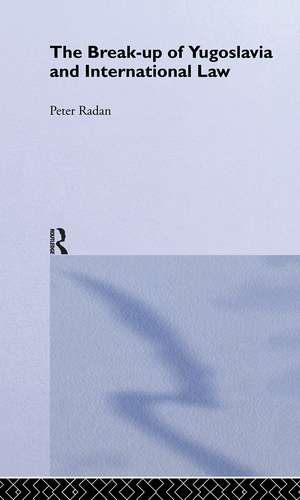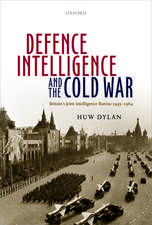The Break-up of Yugoslavia and International Law: Routledge Studies in International Law
Autor Peter Radanen Limba Engleză Hardback – 9 aug 2001
Although international recognition was granted to the former Yugoslav republics of Slovenia, Croatia, Bosnia-Hercegovina and Macedonia, the claims of secessionist movements that sought a revision of existing internal federal borders were rejected. The basis upon which the post-secession international borders were accepted in international law involved novel applications of international law principles of self-determination of peoples and uti possidetis. This book traces the developments of these principles, and the historical development of Yugoslavia's internal borders.
Preț: 673.22 lei
Preț vechi: 792.03 lei
-15% Nou
Puncte Express: 1010
Preț estimativ în valută:
128.82€ • 137.75$ • 107.41£
128.82€ • 137.75$ • 107.41£
Carte tipărită la comandă
Livrare economică 17 aprilie-01 mai
Preluare comenzi: 021 569.72.76
Specificații
ISBN-13: 9780415253529
ISBN-10: 0415253527
Pagini: 288
Dimensiuni: 156 x 234 x 21 mm
Greutate: 0.54 kg
Ediția:New.
Editura: Taylor & Francis
Colecția Routledge
Seria Routledge Studies in International Law
Locul publicării:Oxford, United Kingdom
ISBN-10: 0415253527
Pagini: 288
Dimensiuni: 156 x 234 x 21 mm
Greutate: 0.54 kg
Ediția:New.
Editura: Taylor & Francis
Colecția Routledge
Seria Routledge Studies in International Law
Locul publicării:Oxford, United Kingdom
Cuprins
1. Introduction
2. Nationalism and Self-Determination
3. The 'Nation' as a 'People'
4. The Principle of Uti Possidetis in Latin America
5. The Principle of Uti Possidetis in Asia & Africa
6. The National Question and Internal Administrative Borders in Yugoslavia 1918-1991
7. The International Response to and Course of the Yugoslav Secessions
8. The Badinter Commission: Secession, Self-Determination and Uti Possidetis
Conclusion
2. Nationalism and Self-Determination
3. The 'Nation' as a 'People'
4. The Principle of Uti Possidetis in Latin America
5. The Principle of Uti Possidetis in Asia & Africa
6. The National Question and Internal Administrative Borders in Yugoslavia 1918-1991
7. The International Response to and Course of the Yugoslav Secessions
8. The Badinter Commission: Secession, Self-Determination and Uti Possidetis
Conclusion
Descriere
This book provides a critical analysis from an international law perspective of the break-up of Yugoslavia and will be of interest to those in the fields of international law and political science





















